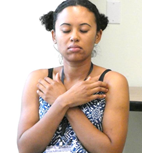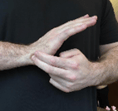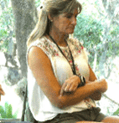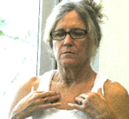A guest post by Mary Watkins, Ph.D.

I am hoping you are each well and taking great care to protect yourself and to help your family, friends, and neighbors in need. Our struggle with Covid-19 is both physical and psychological. As our daily routines are upended and many of us are working and conducting our lives from home, there are important healing and centering mind-body practices that we can learn and then pass on to others.
One of our treasured adjunct faculty in the Community, Liberation, Indigenous, and Eco-Psychologies specialization is Pat Cane, founder of CAPACITAR. For decades she has been studying how to use healing and movement traditions from around the world to address collective trauma and stress, fear and anxiety. Borrowing from Paulo Freire’s approach to popular education, she has trained thousands of people who have suffered collective trauma in what she calls “body literacy.” CAPACITAR empowers people to be their own healers, but it also encourages all participants to teach the methods and exercises to others. So, for instance, if twenty people are in a workshop and they each teach ten people who each teach ten people, and so forth, the practices begin to flourish in neighborhoods, schools, parks, hospitals, prisons, and refugee camps. Due to this empowering approach, CAPACITAR holds workshops all over the world, including inside immigrant detention centers in the U.S.
As you encounter your own stress, fear and anxiety, turn to some of the practices below. Enjoy them, learn them, and pass them on. Practice them with whoever is around. Experiment with them throughout the day, every day, while we discover how to slow our lives down. Meanwhile, while daily life is curtailed, notice what you can do without, what you deeply and sincerely miss, and what more solitude may gift you with. And, of course, go wash your hands, and then check in with someone you suspect is feeling scared and lonely.
Capacitar Practices
Transforming Anxiety and Fear: The Finger Holds
This practice is a simple way to reconnect with inner wisdom and to transform strong feelings. Often we judge emotions as “good” or “bad” rather than recognizing them as wise messages from the body guiding us in our response to challenges, dangers or people in our environment.
With overwhelming feelings, energy can become blocked or repressed, resulting in pain or congestion in the body. Holding each finger for several minutes while breathing slowly and deeply can release and balance pent up feelings.


Finger Hold Protocol
Thumb: tears, grief, sadness, emotional pain
Hold your thumb to transform your grief to wisdom and compassion.
Index Finger: fear, panic, terror
Hold the index finger to transform fear, panic and terror to courage and clarity for action.
Middle Finger: anger, rage, resentment
Hold the middle finger to transform anger and rage to focus, action, and passion.
Ring Finger: anxiety, preoccupation, nervousness
Hold the ring finger to transform anxiety to peace and strength.
Small Finger: victimhood, low self-esteem
Hold the small finger to transform emotions to self esteem and empowerment.
Center of the hand: peace, harmony, balance, wellbeing
Press into the center of your hand to move and balance your emotions.
To Ground & Center:
Hold fingertips together, cross the ankles and breathe deeply to center and ground yourself when feeling overwhelmed.
Acupressure Points: For Anxiety and Fear. To Support the Immune System
Self Acupressure Technique
Press firmly into the point, then lighten the pressure until you begin to feel a pulsation. Don’t worry if you don’t feel pulsing. Your energy is flowing whether you feel it or not.
Adults should press points for two to three minutes. Children need only a minute to clear the points and balance their energy.
If a point is sensitive or painful, this is an indication that it needs gentle pressure to release. Enhance the release by breathing deeply and imaging that you are releasing your tension and/or pain.

Fear Points by the Arm Socket
Cross your hands in front of the chest and with the fingertips locate the points in the sensitive areas in the outer part of the upper chest near the arm sockets. The points help alleviate feelings of fear as well as chest-lung congestion. These points can also be tapped like a butterfly to calm and soothe oneself.

Anxiety Point in the Outer Wrist
Press the point in the indentation on the outside of the crease of the wrist, down from the small finger.

Elbow Points to Boost the Function of the Immune System
With the index fingertips, press the points on the outer creases of the elbows.

Chest Points to Boost the Function of the Immune System
Press the points under the heads of the clavicles on both sides of the sternum.
https://capacitar.org/wp-content/uploads/SpringNewsletterColor2020-Public.pdf

Mary Watkins is chair of the Depth Psychology Program, Co-Chair of the Community, Liberation, Indigenous, and Eco- Psychologies Specialization (CLIE), and Coordinator of Community and Ecological Fieldwork and Research in CLIE. She was trained as a clinical and developmental psychologist and was an early member of the archetypal/imaginal psychology movement. She has worked in a wide variety of clinical settings and with groups on issues of peace, diversity, social justice, reconciliation, immigration, and the envisioning of community and cultural transformation. She is the author of Waking Dreams, Invisible Guests: The Development of Imaginal Dialogues, Mutual Accompaniment and the Creation of the Commons, co-author of Toward Psychologies of Liberation, Talking with Young Children about Adoption, and Up Against the Wall: Re-Imagining the U.S.-Mexico Border, and co-editor of Psychology and the Promotion of Peace. Please find Dr. Watkins’ publications available for download here. Courses Taught: Public Conversation, Phenomenology and Communication of Depth Psychological Cultural and Ecological Fieldwork, Psychologies of Liberation, Hermeneutic and Phenomenological Traditions, Liberatory Pedagogies, Community/Ecological Fieldwork, Community Dreamwork, Crafting Generative Questions.



